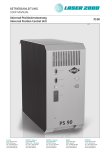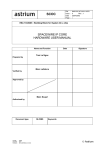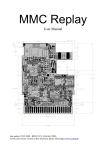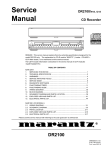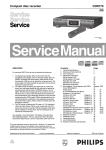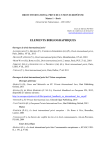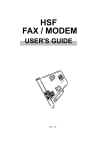Download Eur1553 - ESA Microelectronics Section
Transcript
Eur1553 Ref : Edition : Date : Page : R&D.E53.NT.1206.V.ASTR 0 Rév. : 01 2009/10/23 1/37 Project : contract n° 20041/06/NL/CP Europeanisation of Mil-STD-1553B Data Bus Products Task 1 – Digital Remote Terminal ASIC RT53eur IP Core User Manual Name and Function Prepared by Marc Souyri ASIC expert Verified by Arnaud Wagner Date Signature 12 Nov. 2009 12 Nov. 2009 1553B Expert Authorized by Document type Nicolas BEHOT 1553 product Manager N° WBS Key words : © EADS Astrium SAS Eur1553 Ref : Edition : Date : Page : R&D.E53.NT.1206.V.ASTR 0 Rév. : 01 2009/10/23 2/37 SUMMARY This document is written in the frame of ESA R&D AO/1-5052/06/NL/CP Europeanisation of “MIL STD 1553B Data Bus”. It is part of task 1 related to the development of the RT53eur IP This document is the User Manual of RT53eur IP that is a MIL STD 1553B Remote Terminal © EADS Astrium SAS Ref : Edition : Date : Page : Eur1553 R&D.E53.NT.1206.V.ASTR 0 Rév. : 01 2009/10/23 3/37 DOCUMENT CHANGE LOG Issue/ Revision Date 00/00 29 Oct 2009 00/01 2 Dec 2009 Modified pages all Observations new version of the synchronous IP model IP version is 1.2 – add a source version chapter – add Xilinx synthesis results PAGE ISSUE RECORD Issue of this document comprises the following pages at the issue shown Page Issue/ Rev. All Page Issue/ Rev. Page Issue/ Rev. Page Issue/ Rev. Page Issue/ Rev. Page Issue/ Rev. 00.00 © EADS Astrium SAS Eur1553 Ref : Edition : Date : Page : R&D.E53.NT.1206.V.ASTR 0 Rév. : 01 2009/10/23 4/37 TABLE OF CONTENTS TABLE OF CONTENTS..................................................................................................................4 1. INTRODUCTION ...................................................................................................................6 2. DOCUMENTS, ACRONYMS AND CONVENTIONS..........................................................7 2.1 APPLICABLE DOCUMENTS.........................................................................................................................7 2.2 ACRONYMS ..................................................................................................................................................8 2.3 DEFINITION OF TERMS ..............................................................................................................................9 2.4 CONVENTIONS ....................................................................................................................................10 2.4.1 BIT numbering .........................................................................................................................................10 2.4.2 DATA entity...........................................................................................................................................10 2.4.3 BIT definition ...........................................................................................................................................10 2.4.4 Word numbering in the 1553 frame ..........................................................................................................10 3. INSTALLING THE IP MODEL ........................................................................................... 11 3.1 3.2 4. ENVIRONMENT .........................................................................................................................................13 THE IP MODEL DESCRIPTION ................................................................................................................16 USING THE IP CORE........................................................................................................... 18 5.1 5.2 6. STRUCTURE OF THE DELIVERY ..............................................................................................................12 DESCRIPTION OF RT53EUR IP......................................................................................... 13 4.1 4.2 5. INSTALLATION OF THE DELIVERY ........................................................................................................11 INSTANTIATING THE IP CORE ...............................................................................................................18 CONFIGURING THE IP CORE ..................................................................................................................19 THE TESTBENCH OF THE RT53EUR IP CORE.............................................................20 6.1 TESTBENCH OVERVIEW ...........................................................................................................................20 6.2 THE EMULATOR COMMANDS ..................................................................................................................21 6.2.1 Introduction...............................................................................................................................................21 6.2.2 Synchronisation commands ........................................................................................................................21 6.2.3 Commands of the 1553 Emulator.............................................................................................................21 6.2.4 Commands of the Emuenv Emulator ........................................................................................................23 7. THE SCRIPT FILES DELIVERED WITH THE IP............................................................24 7.1 INTRODUCTION ........................................................................................................................................24 7.2 DECRIPTION OF THE SCRIPTS .................................................................................................................24 7.2.1 msg.nominal.direct.....................................................................................................................................24 7.2.2 test allwc.direct ..........................................................................................................................................25 7.2.3 test allwc.indirect .......................................................................................................................................25 7.2.4 test allwc.stacked .......................................................................................................................................26 8. COMPILING AND SIMULATING THE IP ........................................................................27 8.1 PROCEDURE ...............................................................................................................................................27 © EADS Astrium SAS Eur1553 8.2 9. Ref : Edition : Date : Page : R&D.E53.NT.1206.V.ASTR 0 Rév. : 01 2009/10/23 5/37 RESULTS ......................................................................................................................................................28 SYNTHESIS OF THE RT53EUR IP TO DIFFERENT TECHNOLOGY.........................29 9.1 9.2 9.3 9.4 METHOD ....................................................................................................................................................29 SYNTHESIS IN ACTEL RTAX2000 .......................................................................................................30 SYNTHESIS IN ATMEL ATC18RHA.....................................................................................................31 SYNTHESIS IN VIRTEX4 ...........................................................................................................................34 10. CAO TOOLS CONFIGURATION ....................................................................................36 11. VERSION OF THE SOURCE FILES ...............................................................................36 © EADS Astrium SAS Eur1553 1. Ref : Edition : Date : Page : R&D.E53.NT.1206.V.ASTR 0 Rév. : 01 2009/10/23 6/37 INTRODUCTION This document is written in the frame of ESA R&D AO/1-5052/06/NL/CP Europeanization of “MIL STD 1553B Data Bus”. It is part of task 1 related to the development of a Digital RT IP performing a 1553B Remote Terminal. This document is the User Manual of the IP core. The IP is called RT53eur . • RT stands for Remote Terminal • 53 is a reminder for 1553B Data Bus • EUR reminds that the IP has been developed within the " Europeanisation of Mil-STD-1553B Data Bus Products". Moreover the IP core includes some of the new features defined within the ECSS 5013 "MIL STD 1553 B extension" working group. This document describes the usage of the IP database. The functionality of the IP is described in [AD10]. The version of the IP tagged in CVS is V1.2 © EADS Astrium SAS Eur1553 2. Ref : Edition : Date : Page : R&D.E53.NT.1206.V.ASTR 0 Rév. : 01 2009/10/23 7/37 DOCUMENTS, ACRONYMS AND CONVENTIONS 2.1 APPLICABLE DOCUMENTS AD-2: ECSS Q60-02: Final Draft ASIC/FPGA Development Standard, http://www.estec.esa.nl/microelectronics/asic/Final-Draft-ECSS-Q-60-02.pdf AD-6 MIL-STD-1553B, Notice 1-4, 15 January 1996 “Digital Time Division Command/Response Multiplex Data Bus“. AD-7 MIL-HDBK-1553A, “Multiplex applications Handbook”, 1 http://ams.aeroflex.com/ProductFiles/AppNotes/milhbk1553a.pdf AD-8 SAE AS4112, January 1989 “Production Test Plan For the Digital Time Division Command/Response Multiplex Data Bus Remote Terminals AD-9: SAE AS4111, Issue 1998-10 “Validation Test Plan For the Digital Time Division Command/Response Multiplex Data Bus Remote Terminals AD-10 RT53eur IP core data sheet – Astrium – reference R&D.E53.RP.01192.ASTR AD-14 ASP54 Transceiver ASIC Specification - Astrium – R&D.E53.NT.00461.V.ASTR Nov 1988 © EADS Astrium SAS Eur1553 2.2 ESTEC FPGA GEO I/O ID IDR IEEE IP ITT JTAG LEO LET LVS PCB R&D.E53.NT.1206.V.ASTR 0 Rév. : 01 2009/10/23 8/37 ACRONYMS AD ASIC ASSP CDR CPPA CPU DDR DFF DRC DSP EDAC ESA FDIR Ref : Edition : Date : Page : Applicable Document Application Specific Integrated Circuit Application Specific Standard Product Critical Design Review Central Part Procurement Agency Central Processor Unit Detailed Design Review D-Type Flip Flop Design Rule Check Digital Signal Processor Error Detection And Correction European Space Agency European Space Research and Technology Centre Failure Detection Isolation and Recovery Field Programmable Gate Array Geosynchronous Equatorial Orbit Input/Output Identification Initial Design Review = Specification Requirement Review Institute of Electrical and Electronics Engineers Intellectual Property Invitation To Tender Joint Test Action Group (refer to IEEE std 1149.1) Low Earth Orbit Linear Energy Transfer Layout Versus Schematic Printed Circuit Board PDF PDR PID PRT RD RT SCC SCoC SEE SEL SEP SET SEU SOC SRAM SRR SRT TC TID TM TRP VHDL VLSI VTP WP WWW Portable Document Format Preliminary Design Review Process Identification Document Packet Remote Terminal Reference Document 1533 Remote Terminal Space Components Co-ordination group Spacecraft Controller on a Chip Single Event Effect (or SEP Single Event Phenomena) Single Event Latch up see SEE Single Event Transient Single Event Upset System-On-a-Chip Static Random Access Memory Specification Requirement Review = Initial Design Review Simple Remote Terminal TeleCommand Total Integrated Dose TeleMetry Technological Research Programme VHSIC Hardware Description Language, IEEE standard 1076 Very Large Scale Integration (component) Validation Test Plan (Standard 1553B Test Plan for Remote Terminal ) Work Package World Wide Web © EADS Astrium SAS Eur1553 2.3 Ref : Edition : Date : Page : R&D.E53.NT.1206.V.ASTR 0 Rév. : 01 2009/10/23 9/37 DEFINITION OF TERMS Bus Controller (BC) The Bus Controller’s task is to initiate and control all data transfer on the Mil Std 1553B Data Bus. It is the sole device allowed to transmit Command Words. Remote terminal (RT) The Remote Terminal is used to interface the subsystems to the Mil Std 1553B Data Bus system and perform data transmissions on the Mil Std 1553B Data Bus as controlled by the Bus Controller. Bus Monitor The Bus Monitor’s task is to listen to the Mil Std 1553B Data Bus traffic and to extract selected information to be used at a later time. Mil Std 1553 Data Bus All the hardware including cables, isolation resistors, transformers etc. required to provide a data path between the Bus Controller and all the associated Remote Terminals. Message A single Message is the transmission of a Command Word, Status and Data Words (if they are specified). Mode Command Command Word in which the Subaddress Field is set to ‘00000’ or ´11111´and a Mode Code is transferred from the Bus Controller to the Remote Terminal. Receive Command Message with a data flow from the Bus Controller to the Remote Terminal. Transmit Command Command Word in which the Subaddress Field is set different to ‘00000’ or ´11111´and the subsequent transfer of Data Word(s) from the Remote Terminal to he Bus Controller is initiated. Transmit Message Message with a data flow from the Remote Terminal to the Bus Controller. Vector Word Data Word provided by the Remote Terminal subsequent to the Status Word in answer to a Mode Command Transmit Vector Word. Bit Order The most significant bit shall be transmitted first with the less significant bits following in descending order of value in the Data Word. Redundant Bus The redundant data bus implements a particular approach for obtaining multiple data paths to improve message arrival probability. Bus Switching When an RT is receiving or operating on a message on one bus, and another valid, legal command to the RT occurs on the opposite bus later in time. Superseeding Command When an RT is processing a command, a second valid command word sent to an RT shall take precedence over the previous command. After the minimum intermessage gap time has been exceeded, the RT shall respond to the second valid command when it is not transmitting on that data bus. © EADS Astrium SAS Eur1553 2.4 2.4.1 Ref : Edition : Date : Page : R&D.E53.NT.1206.V.ASTR 0 Rév. : 01 2009/10/23 10/37 CONVENTIONS BIT numbering Bit n° 0 refers to LEAST Significant Bit (LSB) Bit n° 15 refers to MOST Significant Bit (MSB) For 1553 interface, as given in RD4, the Bit 15 (MSB) in registers corresponds to the 4th bit of a 1553 word. 2.4.2 DATA entity “Word” refers to 16 Bits data entity “Byte” refers to 8 Bits data entity “BITi..BIT0” indicates value binary coded in BITi TO BIT0, BITi being the most significant bit “0XNIBi..NIB0” indicates value hexadecimally coded in NIBi TO NIB0, NIBi being the most significant nibble For instance, ‘1111000010101010’ and 0xF0AA indicates the same word value. 2.4.3 BIT definition A bit in a register is 2.4.4 set reset when its value is 1 when its value is 0 Word numbering in the 1553 frame The first data word transmitted in a 1553B message shall be numbered as DW 1, the second transmitted shall be numbered as DW 2 and so on. © EADS Astrium SAS Eur1553 3. 3.1 Ref : Edition : Date : Page : R&D.E53.NT.1206.V.ASTR 0 Rév. : 01 2009/10/23 11/37 INSTALLING THE IP MODEL INSTALLATION OF THE DELIVERY The IP database is provided as a single file that has been generated on a unix workstation with a tar command followed by a gzip command. The user must create a specific directory on unix and then type the following commands: > gunzip delivery.gz > tar xvf delivery The tar command should create the directories described in the next paragraph. The database can be simulated using Modelsim, and synthetized using Synplify for FPGA and Synopsys DC compiler for ASIC. Other tools could be used but no command files are provided. The user shall then modify the modelsim.ini file of the simenv1 directory according to his CAD environment for : std = standard library ieee = IEEE library synopsys = Synopsys libraries – std_arith std_unsigned and std_signed std_developerskit = Mentor Std_developerskit provided with Modelsim synplify = Synplify package containing synplify attributes unisim = unisim Xilinx package simprim = simprim Virtex package modelsim_lib = Mentor modelsim_lib (that contains signal_spy etc…) axcelerator = compiled ACTEL AX library xilinxcorelib = compiled XILINX corelib library The user has to find the std_developerskit, the Actel and the Xilinx libraries that cannot be distributed with the IP. If the user wants to synthetize the IP using an ATMEL libray as ATC18RHA, then the .synopsys_dc_setup file located in synop_atc18rha has to be modified to take into account the location of the ATMEL libraries in the user environment. If the installation is correctly made, typing ../bin/MAKE in the simenv1 directory should execute correctly the compilation of the IP model. © EADS Astrium SAS Eur1553 3.2 Ref : Edition : Date : Page : R&D.E53.NT.1206.V.ASTR 0 Rév. : 01 2009/10/23 12/37 STRUCTURE OF THE DELIVERY The delivery contains the following files: • The bin directory containing procedures for running simulations. • The source directory contains the VHDL files for the top level, the VHDL models for the memories and the netlists for the IP core. • The tbe directory contains the source code of the testbench of the IP. • The scripte directory contains the scripts read by the testbench of the IP. • The simenv1 directory is used for simulating the IP. • The gen_lib directory contains the source code of the generic library used to generate the generic netlist. • The synplify_ax2000 provides an example of synthesis of the IP in ACTEL AX technology • The synplify_virtex provides an example of synthesis of the IP in Xilinx Virtex technology • The synop_atc18rha provides an example of the synthesis of the IP in ATMEL ATC18RHA technology. • The gen_ram_actel is provided for information, it is the result of the generation of the ACTEL AX ram by smartgen. • The gen_ram_xilinx is provided for information, it is the result of the generation of the XILINX ram by coregen. © EADS Astrium SAS Eur1553 4. DESCRIPTION OF RT53EUR IP 4.1 ENVIRONMENT Ref : Edition : Date : Page : R&D.E53.NT.1206.V.ASTR 0 Rév. : 01 2009/10/23 13/37 The RT53eur IP is a 1553B Remote Terminal. When used in nominal and redundant mode, it is connected to the 1553B bus with the following elements, as depicted in Figure 1: • Two single 1553B Transceivers, or a dual 1553B Transceiver • Two 1553B Transformers • A stable oscillator that delivers the IP clock frequency Figure 1 : RT53eur IP functional description The RT53eur IP block diagram is depicted in Erreur ! Source du renvoi introuvable.. It can be functionally divided in 2 parts: the 1553B interface and the Application Interface. The RT53eur IP contains the following functions: • A nominal and a redundant Manchester decoder • A nominal and a redundant Manchester encoder • A redundancy management function • A protocol management function • An application management function © EADS Astrium SAS Eur1553 Ref : Edition : Date : Page : R&D.E53.NT.1206.V.ASTR 0 Rév. : 01 2009/10/23 14/37 © EADS Astrium SAS Eur1553 Ref : Edition : Date : Page : R&D.E53.NT.1206.V.ASTR 0 Rév. : 01 2009/10/23 15/37 Figure 2 : RT53eur IP block diagram © EADS Astrium SAS Ref : Edition : Date : Page : Eur1553 4.2 R&D.E53.NT.1206.V.ASTR 0 Rév. : 01 2009/10/23 16/37 THE IP MODEL DESCRIPTION The IP model structure is depicted in Figure 3. The user has to define the RT53eur core by selecting the following options: • The RT53eur core that can have a synchronous or an asynchronous reset • The quarantine buffer. which can be made with flip-flops, ACTEL AX memories or XILINX Virtex memories. FPGA or ASIC RT53EUR QB_ADR(4:0) QB_DATAR(15:0) QB_DATAW(15:0) QB_WR QB_ADW(4:0) QB_SCANMODE QB_CK RX1B SELCK(2..0) RESETN RESETN CLK_N ADOUT(15:0) ADIN(15:0) AD_EN DERRN SERRN SYNCN TROKN RESETRTN INT SSFB SREQ CHARSN RW DATA(15:0) DATAC(5:0) AD(15:0) DERRN SERRN SYNCN TROKN RESETRTN INT SSFB SREQ SELCK(2..0) CLK CLK RT53EUR CORE TIMEOUT TXEN_N LTEN_N RTPARITY RTAD(4:0) BREN DYNREG TX1 TX1B TX1INH TIMEOUT TXEN_N LTEN_N RTPARITY RTAD(4:0) BREN DYNREG TX1 TX1B TX1INH DATAOUT(15:0) DATAIN(15:0) DATACOUT(5:0) DATACIN(5:0) DATAEN_EN RX1 SCAMODE RX1B TX0B TX0INH TSTFS RX1 TX0 SCAMODE if1553 TX0 TX0B TX0INH RX0 RX0B TSTFS RX0 RX0B QB_RESETN 32w x 16b Quarantine buffer DMAACK DMAREQ BUSBUSY CSREG RWREG CSREADYN CSN configuration Figure 3 : Structure and Usage of the IP core © EADS Astrium SAS application I/F DMAACK DMAREQ BUSBUSY CSREG RWREG CSREADYN CSN CSN_EN CHARSN CHARSN_EN RW RW_EN Eur1553 Ref : Edition : Date : Page : R&D.E53.NT.1206.V.ASTR 0 Rév. : 01 2009/10/23 17/37 The RT53eur core is provided as a generic netlist. Two versions of this netlist are provided: • A version with a synchronous reset in the file named: source/core/rt53core_sync.vhd. • A version with a synchronous reset in the file named: source/core /rt53core_async.vhd. The user has to select which core to use. The following recommendation, that has to be verified for each project, can be given: • for an ATMEL ASIC in 0,35 um or 0,18 um it is recommended to have a synchronous reset, since an SET can impact the asynchronous reset. • for an ACTEL RTAX or SX the asynchronous reset tree is protected against SET and thus the core with the asynchronous reset could be used. • no recommendations are given for Xilinx in flight. The quarantine buffer is a 32-word of 16 bits internal memory used to keep the received words in the direct and indirect modes before delivering them to the application. According to the technology the buffer can be : • a buffer made with flip-flops that is coded in VHDL RTL. • a buffer made using the memories of the ACTEL AX family. It is generated with smartgen. • a buffer made using the memories of the XILINX libraries. It is generated with coregen. The following recommendation can be given • In ACTEL RT54SU there is no internal memory. The buffer has to be made with flip-flops. • In ACTEL RT5AX the buffer can be made with flip-flops or by using the internal memory of the ACTEL. • In ATMEL 0,35 um pure gate array, there is no internal memory, thus the buffer can be made with flip-flops. • In ATMEL 0,35 um composite array or in ATMEL 0,18 um ATC18RHA, it is not really recommended to create a hard block of memory of only 32 words of 16 bits, thus the buffer can be made with flip-flops. © EADS Astrium SAS Eur1553 5. Ref : Edition : Date : Page : R&D.E53.NT.1206.V.ASTR 0 Rév. : 01 2009/10/23 18/37 USING THE IP CORE 5.1 INSTANTIATING THE IP CORE The IP core is easy to instantiate. An example of instantiation of the IP core is also depicted in Figure 3. At first two generics have to be defined: generic( GSYNC_RST : boolean := false; -- asynchronous reset(false), synchronous reset(true) RAMTYPE : natural := 1 -- 1 flip flops, 2 Actel AX, 3 Xilinx ); RAMTYPE selects the type of RAM used to make the quarantine buffer. GSYN_RST selects the type of reset of the IP core. The CLK and CLK_N pins shall be connected to clock and inverted clock signals. There are very few flipflops of the IP core that are controlled by the falling clock edge. The inversion of the clock has been made outside the IP, since it is sometimes required to separate the clock trees (for example, in case of scan insertion with some CAD tools). The user shall add an inverted before the CLK_N pin as depicted. The 1553 IF shall be connected to the input and output buffers of the ASIC or the FPGA driving the interface to the 1553 transceiver. According to the type of your Transceiver (Schmit or Harris), the BUSLEVEL pin shall be defined (refer to [AD10] ). In order to have a symmetric signal it is important to route identically the TXi and TXBi signals to get almost identical rise and fall times. Refer to your Transceiver data sheet. The application interface of the RT53eur IP is provided with split busses: tri-state output buffers have their enable signal provided, and bidirectional pins are split in 3 (in out, and control). The user shall connect the tri-state and bidirectional buffers are shown in Figure 3. © EADS Astrium SAS Eur1553 5.2 Ref : Edition : Date : Page : R&D.E53.NT.1206.V.ASTR 0 Rév. : 01 2009/10/23 19/37 CONFIGURING THE IP CORE A set of configuration signals is used to configure the IP. They are described in the RT53eur IP Core DataSheet [AD10]. The configurations signals must be static either driven by external pins, or forced in the VHDL code. But they shall be defined at reset as explained in [AD10]. These signals are: Definition Name SELCK<2..0> Clock Frequency Selection RTAD<4..0> Address of the RT RTPARITY Odd parity of the RTAD<4..0> address BUSLEVEL select an Harris or Schmitt Transceiver LTEN_N Broadcast Enable, when set to “1” broadcast is allowed (can also be configured by using RT53eur IP register) Time Out selection for an RT to RT exchange: • “0”: 31 µs • “1”: 14 µs Signal for loop function inhibition TXEN_N Signal for encoder output inhibition TSTFS Selection of Fail-Safe test mode i.e. test of the 800 us inhibition timeout. shall be set to zero. DYNREG Enable the dynamic load configuration register (by the 1553 bus) SCANMODE Shall be set to zero – or possibly connected to the SCANMODE signal of the ASIC BREN TIMEOUT Figure 4 : configuration signals of RT53eur IP (see [AD10]) © EADS Astrium SAS Eur1553 6. Ref : Edition : Date : Page : R&D.E53.NT.1206.V.ASTR 0 Rév. : 01 2009/10/23 20/37 THE TESTBENCH OF THE RT53EUR IP CORE 6.1 TESTBENCH OVERVIEW The ASIC testbench is written in full VHDL 93. It is depicted in Figure 5. It is composed of the following modules either used for stimuli’s generation or for checking: • The RT53eur IP core embedded in a wrapper that includes the IO buffers. • Two 1553B emulators modelizing two 1553B Bus controller that are used to generate commands, to generate data words, and to check transmitted data and status. • A memory model connected to the application interface of RT53eur IP. This memory can be initialized by reading a file. • An "Environment" emulator that is connected to the application bus as the memory. It contains an arbiter that is able to grant the bus to the IP. It is able to read and check the ASIC register and to read and check memory content. All the emulators are able to read a script file that contains generation and check commands. The memory of the application interface can be initialized by a file, which is needed to define the characterization data for example. The testbench is auto-verifier. By searching ERROR string in the log file, the correctness of the response can be verified. Figure 5 : RTEUR53 testbench structure © EADS Astrium SAS Eur1553 6.2 6.2.1 Ref : Edition : Date : Page : R&D.E53.NT.1206.V.ASTR 0 Rév. : 01 2009/10/23 21/37 THE EMULATOR COMMANDS Introduction Each emulator has a set of commands allowing to define and check signals. The commands are listed in the present section. The scripts located in the scripte directory provide many examples of their usage. 6.2.2 Synchronisation commands The following commands are used to synchronize the 3 emulators and to visualize signals. WAIT_T time Function : wait for time before reading the next command syntax : WAIT_T time PAUSE Function : wait all other emulators syntax : PAUSE TRACE dec Function : Assign the signal TRACE that allows a visualisation of simulation progress in the waveform window syntax : TRACE dec 6.2.3 Commands of the 1553 Emulator SEND_COM RTAD E/R SA CWC Function : Fill array in order to Send a command word on 1553 bus RTAD : Address of the remote terminal (0..30), or Broadcast Address (31) E/R : E or R for Transmit or Receive SA : Sub Address (1..30), or Mode Command (31) CWC : Number of Data Words, or Value of the Mode Command syntax : SEND_COM dec str dec dec SEND_CC RTAD E/R CODE Function : Fill array in order to Send a Mode command word on 1553 bus RTAD : Address of the remote terminal (0..30), or Broadcast Address (31) E/R : E or R for Transmit or Receive CODE : Value of the Mode Command syntax : SEND_CC dec str dec SEND_DATA NBDATA DATA1 DATA2 .. DATA8 © EADS Astrium SAS Eur1553 Ref : Edition : Date : Page : R&D.E53.NT.1206.V.ASTR 0 Rév. : 01 2009/10/23 22/37 Function : Fill array in order to send Data words on 1553 bus NBDATA : Number of data words DATA1, DATA2, ..., DATA8 : hexadecimal value of the data words. 8 values shall be entered, even if only e.g. 3 words are used. The remaining ones shall be set to 0000. Sending 5 data words can be done by issuing 5 SEND_DATA commands with one valid word or by sending only one SEND_DATA command with 5 valid words Sending 32 words cane be done by sending 4 SEND_DATA commands with 8 valid words syntax : SEND_DATA dec hex hex hex hex hex hex hex hex SEND_BUS Function : effectively send the command word and data (if any) on the bus syntax : SEND_BUS CHECK_STATUS RTAD ERR DIFF OCC STATUS Function : Receive and check of the status word RTAD : Address of the remote terminal (0..30), or Broadcast Address (31) ERR : OK or ERROR DIFF : BROADCAST or SINGLE OCC : BUSY or FREE STATUS : The 8 bits of the reserved field of the status syntax :CHECK_STATUS dec str str str str READ_DATA NBDATA Function : Receive without checking NBDATA NBDATA : Number of data words syntax : READ_DATA dec CHECK_DATA NBDATA DATA1 DATA2 .. DATA8 Function : Receive and check of NBDATA data words NBDATA : Number of data words DATA1, DATA2, ..., DATA8 : hexadecimal value of the data words. 8 values shall be entered, even if only e.g. 3 words are received. The remaining ones shall be set to 0000 and are not checked. syntax : CHECK_DATA dec hex hex hex hex hex hex hex hex ECHO MESSAGE Function : print a message in the log file of the simulator MESSAGE : string to print syntax : ECHO str © EADS Astrium SAS Eur1553 6.2.4 Ref : Edition : Date : Page : R&D.E53.NT.1206.V.ASTR 0 Rév. : 01 2009/10/23 23/37 Commands of the Emuenv Emulator ==================== Application Interface - Register and RAM Access ============ REG_READ address exp_data Function : performs a read in an ASIC register read data shall be equal to exp_data syntax : REG_READ hex hex REG_WRITE address data Function : performs a write in an ASIC register syntax : REG_WRITE hex hex RAM_READ address exp_data Function : performs a read in an the application memory read data shall be equal to exp_data syntax : RAM_READ hex hex RAM_WRITE address data Function : performs a write in the application memory syntax : RAM_WRITE hex hex ====================Application Interface - check IT===================== CHECK_TROKN tmax check that TROKN signal rise before tmax syntax : CHECK_TROKN time ====================Configuration commands===================== VALUE SIGNAL VAL Function : Set the value of the signal SIGNAL at VAL (hex) syntax : VALUE str hex VALUE_AFTER SIGNAL VAL TIME Function : Set the value of the signal SIGNAL at VAL (hex) after time TIME syntax : VALUE_AFTER str hex time ECHO MESSAGE Function : print a message in the log file of the simulator MESSAGE : string to print syntax : ECHO str © EADS Astrium SAS Eur1553 7. THE SCRIPT FILES DELIVERED WITH THE IP 7.1 INTRODUCTION Ref : Edition : Date : Page : R&D.E53.NT.1206.V.ASTR 0 Rév. : 01 2009/10/23 24/37 The whole simulation plan of the RT53eur IP core is not delivered since it requires a more complex testbench to be used. The IP is provided with 4 scripts that are: • msg.nominal.direct : basic exchanges • allwc.direct : all word count in direct mode • allwc.indirect : all word count in indirect mode • allwcc.stacked : all word cound in stacked mode. 7.2 DECRIPTION OF THE SCRIPTS 7.2.1 msg.nominal.direct Name msg.nominal.direct Object Test of the ASIC nominal T/R functionalities according to 1553 messages [General configuration of the test] • Current testbench • Characterization word legalizes subaddress tested Frame 10 : Receive message in DIRECT mode • Direct mode is defined in characterization word • Send a 1553 message with reception of 2 data • Check the status emission Frame 20 : Transmit message in DIRECT mode • Direct mode is defined in characterization word • Send a 1553 message with transmission of 2 data • Check the status emission Frame 30 : Receive message in INDIRECT mode • Direct mode is defined in characterization word • Send a 1553 message with reception of 2 data • Check the status emission Frame 40 : Transmit message in INDIRECT mode • Direct mode is defined in characterization word • Send a 1553 message with transmission of 2 data © EADS Astrium SAS Eur1553 • Ref : Edition : Date : Page : R&D.E53.NT.1206.V.ASTR 0 Rév. : 01 2009/10/23 25/37 Check the status emission Frame 50 : Receive message in STACKED mode • Direct mode is defined in characterization word • Send a 1553 message with reception of 2 data • Check the status emission Frame 60 : Transmit message in STACKED mode • Direct mode is defined in characterization word • Send a 1553 message with transmission of 2 data • Check the status emission 7.2.2 test allwc.direct Name allwc.direct Object Test of the all word count in Rec Tr Broadcast in direct mode [General configuration of the test] • All IT unmasked except Endmsg • RTC disabled • All exchanges declared valid by setting ILLENAB in configuration register 1 • All characterization word are initialized in direct mode • For each message, a pseudo aleatory subaddress ranging from 1 to 30 is used. Frames R : send 32 receive messages • Send 32 messages with word count from 1 to 32 but not in sequence • Check correctness of each exchange Frames T : send 32 transmit messages • Send 32 messages with word count from 1 to 32 but not in sequence • Check correctness of each exchange Frames B : send 32 broadcast messages • Send 32 messages with word count from 1 to 32 but not in sequence • Check correctness of each exchange 7.2.3 test allwc.indirect Name allwc.indirect Object Test of the all word count in Rec Tr Broadcast in indirect mode © EADS Astrium SAS Eur1553 Ref : Edition : Date : Page : R&D.E53.NT.1206.V.ASTR 0 Rév. : 01 2009/10/23 26/37 [General configuration of the test] • All IT unmasked except Tiover and Endmsg • All exchanges declared valid by setting ILLENAB in configuration register 1 • All characterization word are initialized in indirect mode • For each message, a pseudo aleatory subaddress ranging from 1 to 30 is used. Same tests as allwc.direct but in indirect mode 7.2.4 test allwc.stacked Name allwc.stacked Object Test of the all word count in Rec Tr Broadcast in stacked mode [General configuration of the test] • All IT unmasked except Tiover and Endmsg • All exchanges declared valid by setting ILLENAB in configuration register 1 • All characterization word are initialized in stacked mode • For each message, a pseudo aleatory subaddress ranging from 1 to 30 is used. Same tests as allwc.direct but in stacked mode © EADS Astrium SAS Eur1553 8. COMPILING AND SIMULATING THE IP 8.1 PROCEDURE Ref : Edition : Date : Page : R&D.E53.NT.1206.V.ASTR 0 Rév. : 01 2009/10/23 27/37 Simulation and compilation are only given for Modelsim simulator. The compilation of the IP is made in the simenv1 directory. The compilation of the IP is made by executing: ../bin/MAKE ../bin/MAKETB Warnings are issued when compiling the xilinx models. They are normal since the configuration provided by Xilinx does not contain the entity declaration. ** Warning: [8] ../source/sram_xilinx.vhd(121): (vcom-1155) Formal port "dinb" "blkmemdp_v6_3" is not in the component declaration. ** Warning: [8] ../source/sram_xilinx.vhd(121): (vcom-1155) Formal port "ena" "blkmemdp_v6_3" is not in the component declaration. ** Warning: [8] ../source/sram_xilinx.vhd(121): (vcom-1155) Formal port "enb" "blkmemdp_v6_3" is not in the component declaration. ** Warning: [8] ../source/sram_xilinx.vhd(121): (vcom-1155) Formal port "web" "blkmemdp_v6_3" is not in the component declaration. …. etc…. ** Warning: [8] ../source/sram_xilinx.vhd(121): (vcom-1155) Formal port "rfda" "blkmemdp_v6_3" is not in the component declaration. ** Warning: [8] ../source/sram_xilinx.vhd(121): (vcom-1155) Formal port "rfdb" "blkmemdp_v6_3" is not in the component declaration. ** Warning: [8] ../source/sram_xilinx.vhd(121): (vcom-1155) Formal port "douta" "blkmemdp_v6_3" is not in the component declaration. declared in entity declared in entity declared in entity declared in entity declared in entity declared in entity declared in entity A warning is also issued when running MAKETB. It is normal. ** Warning: [8] ../tbe/pack_emu_gene.vhd(292): (vcom-1009) Implicit "&" operator uses 1993 rules when computing actual for formal "s" of subprogram "print". The simulation of the IP is made in the simenv1 directory. It is run with the SIME perl procedure. # ../bin/SIME [options] [reference_testbench reference_script configuration] # # options : # -help : detailed help # -ref : reference simulations # batch mode and save the log files in ./zzlog_ref # -f=xxx : force IP frequency to 10 12 ...24 MHz # if omitted the frequency used for the previous simulation is used since © EADS Astrium SAS Eur1553 Ref : Edition : Date : Page : R&D.E53.NT.1206.V.ASTR 0 Rév. : 01 2009/10/23 28/37 # it is stored in the .freq file # -ramax : Quarantine buffer is made with ACTEL AX memories (default flip_flop) # -ramxi : Quarantine buffer is made with XILINX VIRTEX memories (default flip_flop) # -syncrst : Synchronous reset (default asynchronous) # arguments : # reference_script : name of the script or ALL for example : ../bin/SIME msg.nominal1 –f=24 Simulate IP with msg.nominal1 script at 24 MHz in interactive mode IP has an asynchronous reset and buffer made with flip-flops ../bin/SIME msg.nominal1 –ramax –syncrt –f=10 Simulate IP with msg.nominal1 script at 10 MHz in interactive mode IP has a synchronous reset and buffer made with ACTEL AX memories ../bin/SIME all –f=24 -ref Simulate IP with all the scripts at 24 MHz in batch mode and save the log files in zzlog_ref IP has an asynchronous reset and buffer made with flip-flops ../bin/SIME all –f=24 Simulate IP with all the scripts at 24 MHz in batch mode IP has an asynchronous reset and buffer made with flip-flops 8.2 RESULTS The IP is provided with the simulation results for the 3 buffer types, the 2 reset types, the 4 script files and 2 frequencies (10 and 24 MHz) generating 48 log files stored in zzlog_ref directory. The name of a log file is built as described below : "Script_name"_[ax|xi|dff]_[|s]_"frequency".log The BATCH command located in simenv1 allows to run all the simulations described above. A chkvslog perl procedure is provided in ../bin and checks the errors and warnings in the log files. The initial error at 0 ps are removed for the ACTEL AX Ram. An AA_errorr_summary.txt file is created that gives the number of errors. No errors are reported in the provided files. © EADS Astrium SAS Eur1553 Ref : Edition : Date : Page : R&D.E53.NT.1206.V.ASTR 0 Rév. : 01 2009/10/23 29/37 9. SYNTHESIS OF THE RT53EUR IP TO DIFFERENT TECHNOLOGY 9.1 METHOD The core of RT53eur IP is provided as a generic netlist. This generic netlist is based on a generic library provided in the gen_lib directory. The library that contains all the cells required to synthesize the VHDL code to the IP core. These cells are used. ADD AND2 AND3 AND4 AOI22 BUF2X BUF4X DFF DFFR DFFSB INV INV2X INV4X MUX21 NAND2 NAND3 NAND4 NOR2 NOR3 OAI22 OR2 OR3 RLAT XNOR2 XOR2 Adder AND2 cell AND3 cell AND4 cell And Or cell buffer with a drive of 2 buffer with a drive of 4 HDFF HDFFR HDFFSB INV INV2X INV4X Multiplexer NAND2 cell NAND3 cell NAND4 cell NOR2 cell NOR3 cell Or And cell OR2 cell OR3 cell RLAT XNOR2 gate XOR2 gate Figure 6 : the generic library cells The RT53eur IP can be synthetized in any technology. Example of synthesis are given for : • ACTEL RTAX2000 component using Synplify synthesis. • ATMEL ATC18RHA using Synopsys DC compiler. © EADS Astrium SAS Eur1553 Ref : Edition : Date : Page : R&D.E53.NT.1206.V.ASTR 0 Rév. : 01 2009/10/23 30/37 9.2 SYNTHESIS IN ACTEL RTAX2000 An example of synsthesis in ACTEL RTAX2000 is given in the synplify_ax2000 directory. The synthesis tool used is Synplify issue 9.6.2. The .prj file is provided. The top level of the IP has been copied locally to modify the generics: quarantine buffer made with ACTEL memory and asynchronous reset. The number of cells of the synthesis is provided hereafter: Resource Usage Report of RT53eur Combinational Cells: 2782 of 21496 (13%) Sequential Cells: 960 of 10752 (9%) Total Cells: 3742 of 32248 (12%) Clock Buffers: 3 IO Cells: 129 Details: and2: and2a: and2b: and3: and3a: and3b: and3c: and4: and4a: and4b: and4c: buff: cm8: cm8inv: dfp1b: inv: or2: or2a: or2b: or3: or3a: or3b: or3c: or4: or4a: or4b: or4c: or4d: xa1: xnor2: xor2: df1: dfc1b: dfe3c: 191 comb:1 186 comb:1 74 comb:1 35 comb:1 52 comb:1 34 comb:1 26 comb:1 12 comb:1 32 comb:1 35 comb:1 13 comb:1 9 comb:1 1616 comb:1 876 51 seq:1 14 comb:1 36 comb:1 100 comb:1 87 comb:1 16 comb:1 28 comb:1 34 comb:1 11 comb:1 2 comb:1 19 comb:1 16 comb:1 19 comb:1 9 comb:1 12 comb:1 25 comb:1 39 comb:1 40 seq:1 767 seq:1 99 seq:1 © EADS Astrium SAS Eur1553 dfe4f: 3 seq:1 clkbuf: inbuf: outbuf: 2 clock buffer 67 60 clkint: 1 clock buffer RAM64K36: XOR4: false: true: 1 18 3016 3016 Ref : Edition : Date : Page : R&D.E53.NT.1206.V.ASTR 0 Rév. : 01 2009/10/23 31/37 RAM/ROM Usage Summary Block Rams : 1 of 64 (1%) The critical paths are provided hereafter Requested Estimated Requested Estimated Clock Frequency Frequency Period Period Slack ------------------------------------------------------------------------CK 24.0 MHz 55.5 MHz 41.667 17.973 17.205 CK_N 24.0 MHz 55.5 MHz 41.667 17.973 12.298 ============================================ Worst slack in design: 12.298 9.3 SYNTHESIS IN ATMEL ATC18RHA An example of synsthesis in ATMEL ATC18RHA is given in the synop_atc18rha directory. The synthesis tool used is Synopsys DC Compiler issue 2007.03-SP5-1. The SYN.tcl file is provided. The top level of the IP has been copied locally to modify the generics: quarantine buffer made with flip-flops and synchronous reset. The number of cells of the synthesis is provided hereafter, the result is given in um² since it is a standard cell technology. The critical path is also provided. The IP runs at about 58 MHz, but a derating of about 30% has to be taken for routing. In any case, the maximum frequency of the IP that is 24 MHz is largely exceeded. **************************************** Report : reference Design : RT53eur Version: Z-2007.03-SP5-1 Date : Mon Nov 9 14:07:24 2009 **************************************** Attributes: b - black box (unknown) bo - allows boundary optimization © EADS Astrium SAS Eur1553 d mo h n r s u - Ref : Edition : Date : Page : R&D.E53.NT.1206.V.ASTR 0 Rév. : 01 2009/10/23 32/37 dont_touch map_only hierarchical noncombinational removable synthetic operator contains unmapped logic Reference Unit Area Count Total Area Attributes ---------------------------------------------------------Reference Library Unit Area Count Total Area Attributes -----------------------------------------------------------------------an02d1 15.68 94 1473.92 an03d1 18.81 47 884.35 an04d1 25.08 13 326.14 aoi21d1 15.68 96 1505.28 aoi21d2 31.36 2 62.72 aoi22d1 18.81 48 903.16 aoi31d1 18.81 63 1185.40 aoi211d1 18.81 45 846.71 aoi211d2 34.49 2 68.99 aoi221d1 25.08 38 953.34 aoi222d1 31.36 9 282.24 aoi311d1 21.95 13 285.37 aoi321d1 31.36 9 282.24 aoi322d1 34.49 8 275.96 aoim21d1 18.81 14 263.42 aoim22d1 21.95 41 900.03 aoim31d1 21.95 11 241.47 aoim211d1 21.95 7 153.66 aon211d1 18.81 102 1919.23 aor21d1 21.95 4 87.80 aor22d1 25.08 18 451.58 aor31d1 21.95 15 329.27 aor31d2 25.08 1 25.08 aor211d1 25.08 1 25.08 aor221d1 31.36 2 62.72 aor311d1 25.08 7 175.61 buffd1 12.54 140 1756.15 buffd3 15.68 1 15.68 cg01d1 28.22 2 56.44 hdfcrb1 254.01 27 6858.43 n hdfnrb1 235.19 1394 327868.76 n hdfprb1 254.01 15 3810.24 n inv0d0 6.27 358 2245.37 inv0d1 9.40 130 1223.03 inv0d2 12.54 7 87.80 nd02d0 12.54 10 125.43 nd02d1 12.54 292 3662.84 nd02d2 18.81 33 620.92 nd03d0 15.68 1 15.68 nd03d1 15.68 110 1724.80 nd03d2 28.22 13 366.91 nd04d1 18.81 98 1843.96 © EADS Astrium SAS Eur1553 Ref : Edition : Date : Page : R&D.E53.NT.1206.V.ASTR 0 Rév. : 01 2009/10/23 33/37 nd04d2 34.49 12 413.95 nd12d0 15.68 1 15.68 nd12d1 15.68 32 501.76 nd12d2 25.08 5 125.43 nd13d1 21.95 11 241.47 nr02d0 12.54 14 175.61 nr02d1 12.54 209 2621.69 nr02d2 18.81 3 56.44 nr03d1 15.68 113 1771.84 nr03d2 31.36 7 219.52 nr04d1 18.81 111 2088.57 nr04d2 34.49 17 586.43 nr13d1 21.95 5 109.75 oai21d1 15.68 155 2430.40 oai21d2 31.36 5 156.80 oai22d1 18.81 1139 21431.42 oai31d1 21.95 7 153.66 oai31d2 34.49 7 241.47 oai211d1 18.81 78 1467.64 oai221d1 28.22 21 592.70 oai222d1 28.22 216 6096.38 oai311d1 25.08 3 75.26 oai321d1 31.36 13 407.68 oai322d1 34.49 16 551.93 oaim21d1 18.81 22 413.95 oaim21d2 34.49 1 34.49 oaim22d1 25.08 22 551.93 oaim31d1 25.08 2 50.17 oaim211d1 25.08 3 75.26 oan211d1 18.81 83 1561.72 or02d1 15.68 24 376.32 or03d1 21.95 5 109.75 or04d1 25.08 6 150.52 ora31d1 25.08 1 25.08 ora211d1 25.08 2 50.17 ora311d1 28.22 1 28.22 xn02d1 34.49 14 482.94 xr02d1 31.36 161 5048.96 xr03d1 53.31 36 1919.23 ----------------------------------------------Total 81 references 419665.78 1 Startpoint: core/ifa_edacc_DataInR_reg_2/Q_reg (rising edge-triggered flip-flop clocked by CK) Endpoint: core/ifa_ctl_FirstStackPointer_reg_0/Q_reg (rising edge-triggered flip-flop clocked by CK) Path Group: CK Path Type: max Des/Clust/Port Wire Load Model Library ------------------------------------------------ © EADS Astrium SAS Eur1553 RT53eur 46KG Ref : Edition : Date : Page : R&D.E53.NT.1206.V.ASTR 0 Rév. : 01 2009/10/23 34/37 ATC18RHA_CELL_slow_1p65v_145c Point Incr Path ------------------------------------------------------------------------clock CK (rise edge) clock network delay (propagated) core/ifa_edacc_DataInR_reg_2/Q_reg/cp (hdfcrb1) core/ifa_edacc_DataInR_reg_2/Q_reg/qn (hdfcrb1) U3374/z (xr02d1) U5619/z (xr03d1) U5618/z (xr03d1) U4986/zn (nr02d1) U3324/zn (aoi21d1) U4782/zn (inv0d0) U5022/zn (nr03d1) U3321/zn (aoi321d1) U5024/zn (oan211d1) U4974/zn (inv0d0) U3319/zn (aon211d1) U4787/zn (inv0d0) U4568/zn (aoi311d1) U4783/zn (inv0d1) U3184/zn (oai211d1) U4784/zn (inv0d0) U4796/zn (aoi311d1) U3177/zn (oai21d1) U4781/zn (inv0d0) U5005/z (an03d1) U4582/zn (inv0d1) U2731/zn (oai22d1) core/ifa_ctl_FirstStackPointer_reg_0/Q_reg/d (hdfcrb1) data arrival time 0.00 0.00 0.00 # 1.12 0.56 0.55 0.58 0.35 0.51 0.67 0.70 0.40 0.51 0.47 0.29 0.66 1.08 0.72 0.59 0.63 0.53 0.32 0.98 1.20 1.12 0.50 0.00 0.00 0.00 1.12 1.69 2.23 2.81 3.16 3.67 4.34 5.04 5.45 5.95 6.42 6.71 7.38 8.46 9.18 9.77 10.41 10.94 11.26 12.24 13.44 14.56 15.05 0.00 15.05 r 15.05 r r r r r f r f r f r f r f r f r f r f r r f r clock CK (rise edge) 32.00 32.00 clock network delay (propagated) 0.00 32.00 core/ifa_ctl_FirstStackPointer_reg_0/Q_reg/cp (hdfcrb1) 0.00 32.00 r library setup time -0.58 31.42 data required time 31.42 ------------------------------------------------------------------------data required time 31.42 data arrival time -15.05 ------------------------------------------------------------------------slack (MET) 16.37 ns 9.4 SYNTHESIS IN VIRTEX4 An example of synthesis of the IP in Virtex 4 is also provided. The Synplify synthesis tool does not recognize the Xilinx memory that will have to be provided during the place and route as an edif file. All the files of the Xilinx memory are provided in the gen_ram_xilinx directory. © EADS Astrium SAS Eur1553 Ref : Edition : Date : Page : R&D.E53.NT.1206.V.ASTR 0 Rév. : 01 2009/10/23 35/37 --------------------------------------Resource Usage Report for rt53eur Mapping to part: xc4vlx100ff1148-10 Cell usage: FD 40 uses FDC 746 uses FDCE 63 uses FDP 48 uses FDPE 3 uses MUXF5 1 use sram_xilinx 1 use LUT1 32 uses LUT2 426 uses LUT3 891 uses LUT4 1209 uses I/O ports: 129 I/O primitives: 127 IBUF 67 uses OBUF 60 uses BUFGP 2 uses I/O Register bits: Register bits not including I/Os: 0 900 (0%) Global Clock Buffers: 2 of 32 (6%) Total load per clock: CK: 896 CK_N: 6 Mapping Summary: Total LUTs: 2558 (2%) Worst slack in design: 18.666 Requested Estimated Requested Estimated Clock Frequency Frequency Period Period Slack ------------------------------------------------------------------------CK 24.0 MHz 72.6 MHz 41.667 13.773 18.737 CK_N 24.0 MHz 173.3 MHz 41.667 5.769 18.666 ============================================ Worst slack in design: 12.298 © EADS Astrium SAS Eur1553 10. Ref : Edition : Date : Page : R&D.E53.NT.1206.V.ASTR 0 Rév. : 01 2009/10/23 36/37 CAO TOOLS CONFIGURATION The configuration of the tools used by Astrium to develop the spacewire core is the following: • VHDL simulator : Mentor Modelsim version 5.8d • Synthesis tool : Synplify version 9.6.2 • Synopsys DC compiler : .2007.03 11. VERSION OF THE SOURCE FILES --======================================================== -- cvs status at Wed Dec 2 14:37:04 CET 2009 -- directory /home/rt53eur/rt53eur/rt53eur_ip/source --======================================================== packrt53eurcmp.vhd Up-to-date work_rev=1.1.1.1 rep_rev=1.1.1.1 rt53eur.vhd Up-to-date work_rev=1.1.1.1 rep_rev=1.1.1.1 rt53eur_wrapper.vhd Up-to-date work_rev=1.1.1.1 rep_rev=1.1.1.1 sram_ax.vhd Up-to-date work_rev=1.1.1.1 rep_rev=1.1.1.1 sram_dff.vhd Up-to-date work_rev=1.1.1.1 rep_rev=1.1.1.1 sram_xilinx.vhd Up-to-date work_rev=1.1.1.1 rep_rev=1.1.1.1 directory core rt53core_async.v Up-to-date work_rev=1.2 rep_rev=1.2 rt53core_async.vhd Up-to-date work_rev=1.2 rep_rev=1.2 rt53core_sync.v Up-to-date work_rev=1.2 rep_rev=1.2 rt53core_sync.vhd Up-to-date work_rev=1.2 rep_rev=1.2 > end of cvs status -----%-----%-----%-----%----- © EADS Astrium SAS Eur1553 Ref : Edition : Date : Page : R&D.E53.NT.1206.V.ASTR 0 Rév. : 01 2009/10/23 37/37 DISTRIBUTION LIST Alberto BOETTI ESA Kostas MARINIS ESA Arnaud WAGNER Astrium Marc SOUYRI Astrium Jean Marc TAINE Astrium Marc Daniel WEBER Astrium Nicolas BEHOT Astrium © EADS Astrium SAS






































